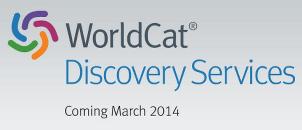 OCLC on January 22 announced WorldCat Discovery Services (WDS), a suite of cloud-based applications that combines FirstSearch and WorldCat Local. Beginning in March, the suite will offer FirstSearch subscribers access to a central index that represents nearly 2,000 e-content collections containing articles, ebooks, and other content from providers including EBSCO, Gale, and ProQuest. In total, WDS will enable the discovery of 1.3 billion electronic, digital, and physical resources in libraries around the world, using a single search.
OCLC on January 22 announced WorldCat Discovery Services (WDS), a suite of cloud-based applications that combines FirstSearch and WorldCat Local. Beginning in March, the suite will offer FirstSearch subscribers access to a central index that represents nearly 2,000 e-content collections containing articles, ebooks, and other content from providers including EBSCO, Gale, and ProQuest. In total, WDS will enable the discovery of 1.3 billion electronic, digital, and physical resources in libraries around the world, using a single search.
“The big change here, for FirstSearch users, is the inclusion of content that used to only come with WorldCat Local,” Andrew Pace, executive director of Networked Library Services for OCLC, told LJ. “I always say that it’s great that we have a neutral platform, but neutrality doesn’t do justice to the breadth of the index that we’ve built in terms of open access content, WorldCat content, and the billion articles from all of the big providers. Just having EBSCO, ProQuest, and Gale in one place, having Taylor & Francis and Elsevier in one place—those are big deals for libraries to have as a single search experience, and not the siloed experience that they’re used to now.”
Developed with input and feedback from 650 beta test libraries and an advisory group of 30 librarians, WDS will ultimately supplant both FirstSearch and WorldCat Local. To facilitate the transition, FirstSearch will continue to operate in parallel with WDS for a year, while WorldCat Local subscribers will have access to both services for 18 months during a beta period beginning in April 2014.
“This is not meant to be a shift from one foot to the other; it’s really meant to be an enhancement to what FirstSearch gives to libraries,” John McCullough, discovery product manager for OCLC, told LJ. “All of the roles that FirstSearch currently plays in libraries—as a reference application, as that content footprint with the staff mode as well as public mode—all of those remain in place. Then, above and beyond that, we have the capability to seamlessly expand that role to fully-fledged, patron-facing discovery.”
In addition to the index, several new features will be included as part of existing FirstSearch subscriptions. For example, the WDS interface was developed using responsive design techniques, enabling it to automatically adjust to any screen size, including desktops, tablets, and mobile devices. In addition, the suite will offer subscribers several fee-based, optional features, such as customized traffic and usage reports, or management tools for course reserves and reading lists.
“What you’re seeing is [a library’s] existing investment in FirstSearch databases and reference interface, a tremendous amount of additional value—such as the central index and the discovery features that will be part of the application—coming to them as part of their existing investment, rather than them having to go out to a commercial product and spend an extra $20, $30, or $40,000 for the same functionality,” McCullough said.
McCullough added that several features of FirstSearch will be retained, such as advanced and expert search modes, as well as many back-end features for staff, noting that “the beta was all about bringing over all of the features that librarians had come to depend on.”
Novice researchers will benefit from the transition as well, McCullough said, describing the discovery experience using the basic search mode in WDS as “vastly improved” compared with FirstSearch. By combining the capabilities of WorldCat Local with FirstSearch, WDS basic searches will ensure that a library’s own resources are listed first in search results, for example. Patrons will also have access to direct links to any full-text resources to which their library subscribes, in addition to other features.
“We worked hard to port over the three-fold experience, where it’s able to be used by your novice researcher…your researcher who might use our advanced search form, and the expert search mode which is geared specifically to library staff,” McCullough said. “I’d say FirstSearch was probably stronger, historically, with those latter two categories. What we’ve really done [with basic search mode in WDS] is build a modern webscale discovery experience with a single search box with faceted results, with locally-sensitive relevance for both print and electronic collections.”
Kurt Munson, resource sharing and reserve librarian, Northwestern University, and part of OCLC’s Reference Advisory Group, described WDS as “an ideal combination of applications for librarians and end users alike. WorldCat Discovery can help us do the complicated work librarians do, and yet it is simple enough for users to just walk up, use it, and find what they need,” he said in a statement.
To facilitate the transition between applications, OCLC has produced a collection of short online training videos, and will host a series of webinars beginning in February, prior to the WDS launch on March 3.
“There is some implementation that libraries will need to do to move from FirstSearch to full-blown discovery with a central index,” said McCullough. “We’ve broken that up into four little tutorials [of 10 minutes each] which should instruct the library on how to implement this fully…And following the release, in addition to the videos, we’ll be doing an aggressive series of webinars that libraries can sign up to and get walked through the process.”


